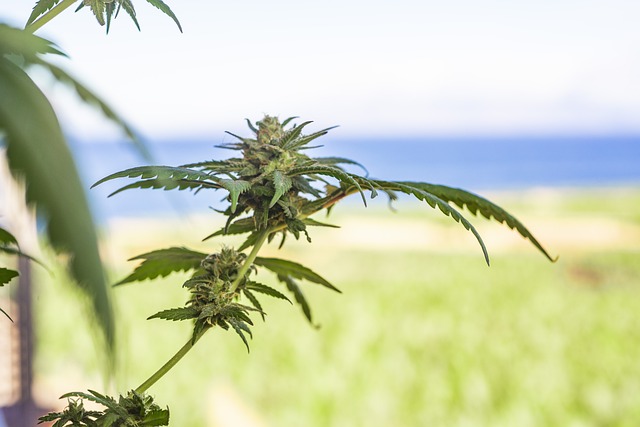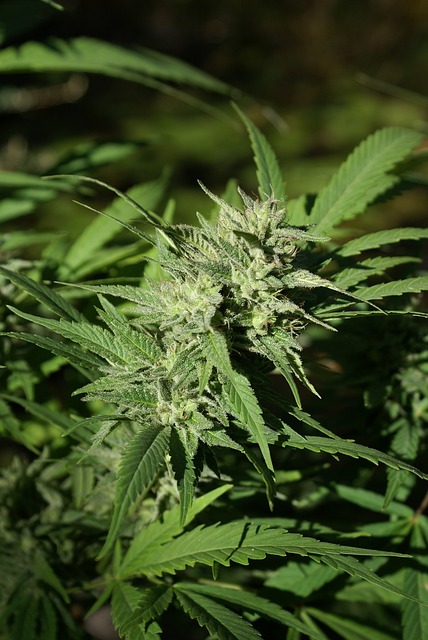
The THCA flower, a non-psychoactive form of cannabinoid found in raw cannabis, has been recognized for its potent anti-inflammatory properties. These benefits stem from its ability to inhibit pro-inflammatory cytokines and enzymes, interacting with the endocannabinoid system, particularly the CB2 receptors, which play a key role in immune system regulation. This interaction helps modulate the body's immune response to inflammatory signals, offering potential relief for conditions like arthritis and colitis. Additionally, THCA has antioxidant properties that protect cells from oxidative stress. These attributes make THCA flower a promising addition to natural and holistic medicine practices. For therapeutic effects without psychoactive influence, it is consumed in its raw form. Research continues into the full scope of THCA's benefits and mechanisms of action for various inflammatory diseases. Users are advised to start with a low dose to gauge personal tolerance, manage common side effects like dry mouth and red eyes, and consult healthcare professionals if they have pre-existing conditions or are taking other medications. Safe and beneficial use of THCA flower relies on informed consumption, proper dosing, and obtaining products from reliable sources to maximize its anti-inflammatory potential while minimizing risks.
Exploring the therapeutic potential of THCA flower, this article sheds light on its anti-inflammatory properties and their mechanisms. We delve into the benefits that users may experience, while also addressing potential side effects to consider for safe consumption. Understanding dosage and safety guidelines is paramount to maximize health advantages and minimize adverse reactions, a topic comprehensively covered in this informative piece.
- Unraveling the Anti-Inflammatory Properties of THCA Flower: A Deep Dive into Its Mechanisms and Benefits
- Potential Side Effects of THCA Flower: Understanding the Risks and Considerations for Consumers
- Navigating THCA Flower Dosage and Safety: Guidelines for Minimizing Adverse Reactions and Maximizing Health Benefits
Unraveling the Anti-Inflammatory Properties of THCA Flower: A Deep Dive into Its Mechanisms and Benefits

THCA, or tetrahydrocannabinolic acid, is a non-psychoactive cannabinoid found abundantly in raw cannabis flowers and is recognized for its potent anti-inflammatory properties. The anti-inflammatory effects of THCA flower are rooted in its ability to inhibit pro-inflammatory cytokines and enzymes that contribute to inflammation within the body. Studies have shown that THCA interacts with the body’s endocannabinoid system, particularly the CB2 receptors known to play a role in regulating immune responses. By activating these receptors, THCA can help modulate the immune system’s response to inflammatory signals, potentially offering relief for conditions like arthritis and colitis.
Furthermore, the anti-inflammatory benefits of THCA are not limited to its interaction with the endocannabinoid system; it also exhibits antioxidant properties that can protect cells from oxidative stress and damage. This dual action contributes to a broad spectrum of health benefits, making the THCA flower a subject of growing interest in natural and holistic medicine. The precise mechanisms through which THCA exerts its anti-inflammatory effects are still being elucidated, but its potential as a therapeutic agent for various inflammatory diseases is clear. Users often consume THCA flowers raw to avoid the psychoactive effects of its decarboxylated form, THC, and to harness its anti-inflammatory properties directly.
Potential Side Effects of THCA Flower: Understanding the Risks and Considerations for Consumers

THCA flower, or tetrahydrocannabinolic acid flour, is a form of cannabis that contains the non-psychoactive acidic precursor to THC, which has garnered attention for its potential therapeutic properties. Among these, the anti-inflammatory effects of THCA are particularly noteworthy, with studies suggesting it may offer relief from conditions like arthritis and other inflammatory diseases without the psychoactive ‘high’ associated with THC. However, as with any substance, consumers should be aware of potential side effects when using THCA flower.
Common side effects include dry mouth and red eyes, which are typical of cannabis products and can often be mitigated by proper hydration and the use of appropriate eye care products. Additionally, some users may experience dizziness or mild anxiety, particularly at higher doses. It is crucial for consumers to start with a low dose and gradually increase it as needed to understand their body’s response to THCA flower. Other less common side effects can include stomach discomfort or altered blood pressure. Individuals with pre-existing health conditions, pregnant or breastfeeding women, and those taking other medications should consult a healthcare professional before incorporating THCA flower into their wellness routine, as it may interact with certain treatments or exacerbate existing medical concerns. Understanding the risks and considerations is essential for a safe and beneficial experience with THCA flower, especially when exploring its anti-inflammatory effects for therapeutic purposes. Consumers should prioritize informed usage and seek products from reputable sources to minimize any potential adverse effects.
Navigating THCA Flower Dosage and Safety: Guidelines for Minimizing Adverse Reactions and Maximizing Health Benefits

When incorporating THCA flower into one’s wellness routine, understanding dosage and safety parameters is crucial for minimizing adverse reactions and maximizing its potential health benefits, particularly its anti-inflammatory effects. THCA, or tetrahydrocannabinolic acid, is a non-psychoactive cannabinoid found in the hemp plant that has been studied for its therapeutic properties. Unlike its psychoactive counterpart, THC, THCA does not induce a high but may still offer significant anti-inflammatory effects, which can be beneficial for managing conditions such as arthritis or other inflammatory diseases.
To safely navigate THCA flower dosage, it is important to start low and go slow. Begin with a small amount to gauge how your body responds before increasing the dosage. Factors such as body weight, individual metabolism, and specific health conditions can influence how THCA affects you. It’s also advisable to consult with a healthcare professional, particularly if you are taking other medications or have pre-existing health concerns. Consistent dosing without exceeding recommended guidelines can help in maintaining the desired anti-inflammatory effects while minimizing potential side effects. Adherence to proper storage and handling of THCA flower is equally important to ensure its potency and efficacy over time. By following these guidelines, users can better harness the benefits of THCA flower, including its promising anti-inflammatory effects, in a safe and responsible manner.
THCA flower, a non-psychoactive compound derived from the cannabis plant, has garnered attention for its potential anti-inflammatory effects, which may offer relief for various inflammatory conditions. While exploring the mechanisms behind these benefits, it’s crucial to address the potential side effects associated with its use. This article has delved into the safety considerations and dosage guidelines necessary to mitigate adverse reactions and enhance overall health benefits. Consumers are encouraged to approach THCA flower with informed caution, considering individual sensitivity and consulting healthcare professionals when integrating it into their wellness regimen. As research continues to evolve, understanding both the therapeutic potential and the nuanced side effects of THCA flower remains paramount for safe and effective use.





